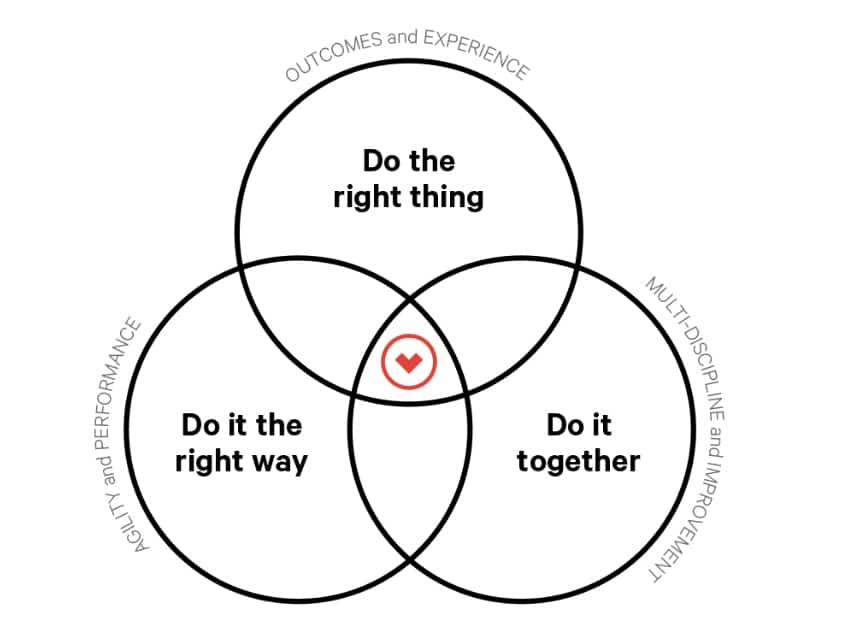
The findings were part of a larger study, commissioned by digital agency Code Computerlove, exploring the opinions and digital practices of UK businesses. It also compared the views of the top performing businesses with those of their mainstream counterparts.
In the report:
- 97% of the digital decision makers in UK businesses questioned believe that focusing on user needs leads to better outcomes
- 97% agree cross-disciplinary teams drive the best results
- 94% said that senior leadership support and buy-in is vital when creating digital products/experiences
- 96% agree team learning and reflection is a necessity for digital transformation
- 92% said long term versus short term goals are more likely to be more successful
- 88% agree Agile approaches are more likely to be successful than traditional ones (e.g. waterfall)
It was quite a different story when the survey asked the same respondents about their actual digital practices.
While 97% believe that user-centricity leads to better outcomes, overall, only 65% said that they put user needs at the heart of their development. Comparing top performing businesses and the mainstream, three-quarters of top performing businesses say they put the user needs at the heart of their development but only half of the mainstream group say the same.
It was a similar result looking at ‘belief’ and ‘practices’ regarding cross-disciplinary teams with just over 70% of all respondents implementing this approach (despite nearly all saying this is necessary for success). Again top-performing companies are slightly more advanced towards multi-disciplinary teams in comparison to their mainstream counterparts (81% versus 66%).
While 96% of the company respondents agree team learning and reflection is a necessity for digital transformation, half (52%) of organisations don’t take time out to learn and reflect. A mere 40% of mainstream businesses said that their teams take time out to learn and reflect on what they are doing.
And looking at practices around long term versus short term goals; while a massive 92% say businesses that concentrate on the long term are likely to be more successful, in practice 53% actually admit to focusing on short-term targets. Only 35% of the mainstream group said that they focus more on long-term goals than short-term targets.
Agility is also cited as a best practice (88% of all companies think agile approaches are more likely to be more successful than traditional ones) but overall only 58% adopt agile methods; this figure dropped to less than half (46%) of mainstream companies and only 58% focus on outcomes in development and are happy to change requirements if needed. 70% of top performing businesses adopt agile processes and three-quarters of the top performing businesses say that they focus on outcomes in development and are happy to change requirements if needed.
Other key findings in the survey include:
- 56% of businesses questioned still leave testing to the end of a project
- Only 51% can attribute ROI to specific digital projects
- And less than half actively look for waste in processes to maximise value
CEO of Code Computerlove, Tony Foggett says, “While our survey was primarily designed to show levels awareness around Product Thinking, a mindset and approach to digital product development, it was striking to see the difference between what companies think will help them drive digital effectiveness and what is happening within their businesses.
“There is clear consensus that digital approaches need to be customer-centric, agile and data-driven, all principals that fall into the Product Thinking mindset that we implement. But all business – whether they are out performing their competition or not – seem a way off actually truly embracing these techniques.
“The survey also highlighted that while most companies agree what the basic principals of a digitally transformed business are, it is the EXECUTION that makes the difference between best performers and the rest. The gap between thinking and doing is much smaller for top-performing companies than it is for their mainstream counterparts.
“So what’s stopping businesses from applying a Product Thinking approach as a means to get ahead? One theory is the degree to which they can, and have, changed their business culture. As businesses move from the traditional ways of working to the more agile/adaptable approaches required for the 21st century they come up against deeply ingrained structural and cultural barriers.
“While agreement with the principals of a digital-first organisation is all but unanimous, the majority of businesses still have cultures that can best be described as retrograde.” Foggett added, “Ultimately ‘Product Thinking’ is a cultural model that pertains not only to a mindset (a collective drive for effectiveness by continually growing value for the customer and company) but also the methodologies, roles and organisational design required to see the approach through.
“While it’s impossible to prove that it’s the implementation of these Product Thinking ideas that is responsible for ‘success’ in the top performing businesses the correlation is extremely strong. In organisational culture, management approach, development philosophy, every area of business practice we looked at showed the firms who acted on the product philosophy were more likely to be successful.”
